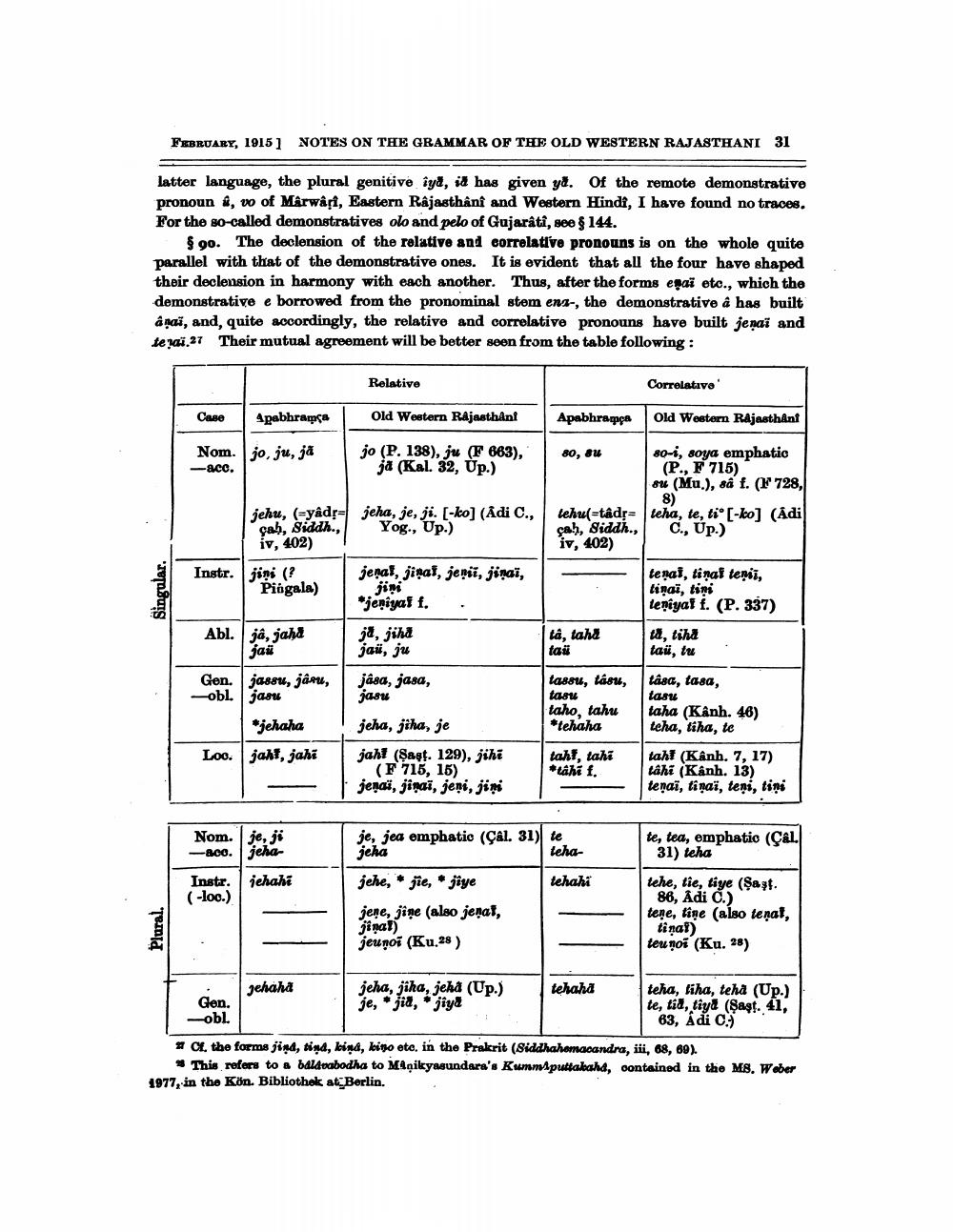________________
latter language, the plural genitive iya, ia has given ya. Of the remote demonstrative pronoun â, vo of Marwari, Eastern Rajasthânî and Western Hindi, I have found no traces. For the so-called demonstratives olo and pelo of Gujarati, see § 144.
FEBRUARY, 1915] NOTES ON THE GRAMMAR OF THE OLD WESTERN RAJASTHANI 31
§ 90. The declension of the relative and correlative pronouns is on the whole quite parallel with that of the demonstrative ones. It is evident that all the four have shaped their declension in harmony with each another. Thus, after the forms eṇaï etc., which the demonstrative e borrowed from the pronominal stem ena-, the demonstrative â has built anai, and, quite accordingly, the relative and correlative pronouns have built jenaï and teaï.27 Their mutual agreement will be better seen from the table following:
Singular.
Plural.
Case
Apabhramça
Nom. jo, ju, ja
-acc.
jehu, (=yâdr çah, Siddh., iv, 402)
Instr. jini (? Pingala)
Abl. ja, jaha jau
Gen. jassu, jâu, -obl. jasu
*jehaha
Loo. jaht, jahi
Nom. je, ji -aco. jeha
Gen. -obl.
Instr. jehahi (-Joo.)
johahd
Relative
Old Western Rajasthani
jo (P. 138), ju (F 663), ja (Kal. 32, Up.)
jeha, je, ji. [-ko] (Adi C., Yog., Up.)
jenal, jinal, jenii, jinaï, jini *jeniyaf f.
jā, jiha jau, ju
jâsa, jasa, jasu
jeha, jiha, je
jahl (Sast. 129), jihë (F 715, 15) jenai, jinai, jeni, jini
Apabhramça
jeha, jika, jehl (Up.) je, *jiä, * jîya
80, 8u
lehu(=tâdr= çah, Siddh., iv, 402)
tâ, taha tai
tassu, tasu, tasu
taho, tahu *tehaha
tahl, tahi *tahi f.
je, jea emphatic (Çâl. 31) te jeha
jehe, jie, jiye
jene, jine (also jeṇat, jinal)
jeunoi (Ku.28)
teha
tehahi
tehaha
Correlative
Old Western Rajasthani
so-i, soya emphatic (P., F 715)
su (Mu.), sá f. (F 728, 8)
teha, te, ti° [-ko] (Adi C, Up)
tenai, tiņal tenii, tiņai, tini
leniyal i. (P. 337)
ta, tiha
tai, tu
tâsa, tasa, tasu
taha (Kânh. 46) teha, tiha, te
tahl (Kânh. 7, 17) tâhi (Kânh. 13) tenai, tinaï, teni, tini
te, tea, emphatic (Çal. 31) teha
tehe, tie, tiye (Sast. 86, Adi C.)
tene, tine (also teṇal, tinai)
teu noi (Ku. 28)
teha, tiha, teha (Up.) te, tid, tiya (Sast. 41, 63, Adi C.)
Cf. the forms jind, tind, kind, kino etc. in the Prakrit (Siddhahemacandra, iii, 68, 69).
This refers to a bálávabodha to Manikyasundara's Kummiputtakahé, contained in the M8. Weber 1977, in the Kön. Bibliothek at Berlin.




